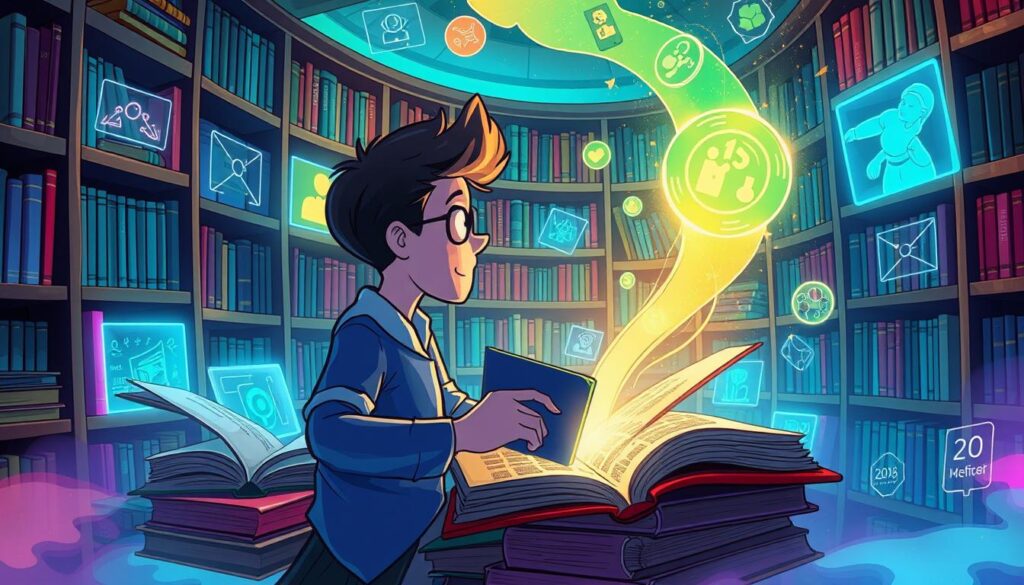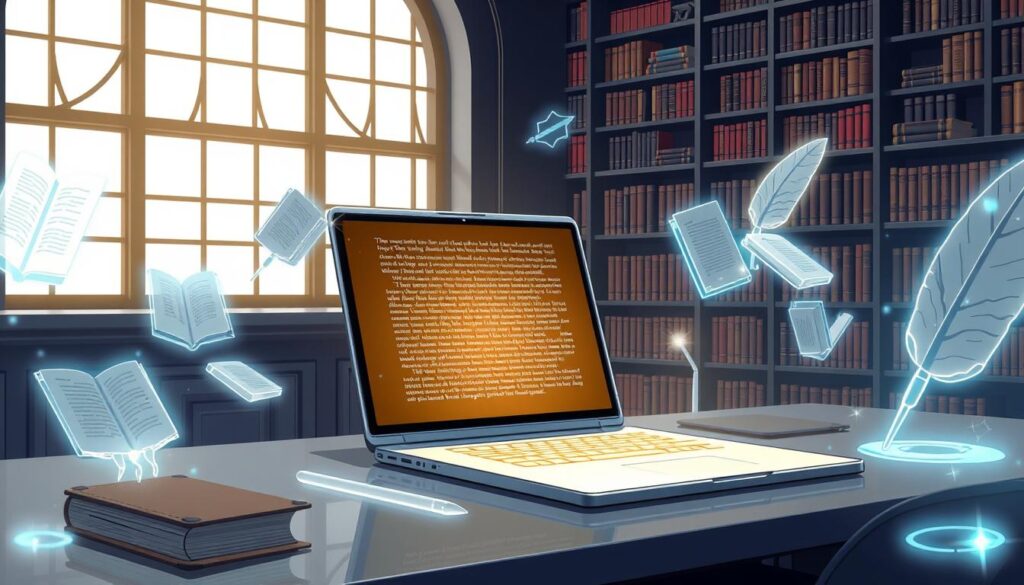Imagine a world where AI helps writers create their best work. It also makes new stories, tailored to each reader’s taste. This is our reality, thanks to AI’s fast growth. It has changed literature a lot.
Studies show AI tools write up to 20% of online content. This shows how big AI’s effect is on literature today.
AI can improve writing with its natural language skills. It can also come up with new stories and characters. AI’s role in writing is clear.
But AI does more than just write. It changes how we find, read, and enjoy books. Now, we get books we might like and fun reading experiences. This article will show you how AI is changing literature.
The Rise of AI in the Literary World
In today’s digital age, the literary world has changed a lot. Technology is now key in how we read and write. E-books and digital publishing have made it easy to access books online.
Now, readers can explore huge digital libraries on their devices. This change has opened up the literary world. It lets authors publish their work on their own and reach people all over the world.
Prevalence of Technology
Technology is a big part of literature today. E-books make up 20% of all book sales worldwide. This shows a big move towards digital reading.
Artificial intelligence (AI) has also changed the literary world a lot. Over 90% of writers use AI tools to help them write better. These tools have made writing 40% faster, helping with articles, blog posts, and more.
Tools like Grammarly and ProWritingAid are very good at finding grammar and style mistakes. They are 95% accurate, better than human proofreaders. This technology has made writing and publishing easier and changed how we read and analyze books.
AI Writing Assistance
In today’s world, AI writing tools are key for authors and writers. Tools like Grammarly, ProWritingAid, and Hemingway Editor help with grammar and style. Content generators like GPT-3, Copy.ai, and Writesonic make writing easier and faster.
Grammar and style checkers give instant tips to improve writing. They find errors and suggest better ways to write. This lets writers edit faster and focus on their creativity.
Content Generators
Content generators are also amazing. They use AI to write articles, marketing copy, and stories. Tools like GPT-3, Copy.ai, and Writesonic create text that fits the context. They help writers get past creative blocks and try new ideas.
AI language tools like Google Translate and DeepL are also crucial. They help writers share their ideas in many languages. This way, writers can reach people all over the world.
AI has changed how we write today. It helps writers improve, work faster, and explore new ideas. Yet, it lets them keep their unique voice and vision.
How AI is influencing modern literature
The world of literature is changing fast thanks to artificial intelligence (AI). AI is changing how we write poetry, fiction, and analyze books. It’s making new kinds of ai-generated poetry and collaborative poetry possible.
In fiction, ai-generated novels and interactive fiction are now a thing. These stories change based on what you choose, making each one special. This new way of telling stories is exciting and making us rethink who authors are.
AI is also helping writers understand their stories better. Tools like plot and character analysis use AI to spot patterns and character types. This mix of tech and writing is changing literature in big ways.

Interactive Fiction
Interactive fiction is a big deal where AI meets literature. These stories change based on what you pick, making your reading experience unique. AI helps shape the story, making it fit your tastes perfectly.
AI in Publishing
The publishing world is changing fast, thanks to AI. AI is making big changes in how we analyze manuscripts, do market research, and understand readers. It helps check manuscripts for grammar, style, and plagiarism. This makes it easier for publishers to pick the best work.
Manuscript Analysis
AI can sort manuscripts into genres and sub-genres. This gives publishers a peek into what’s new in literature. AI also helps with market research, looking at lots of data to find out what sells best. It even suggests books based on what readers like.
AI is making publishing better in many ways. It improves content quality and makes the process more efficient. As AI becomes more common, we’ll see more smart choices, personalized books, and smoother operations.

AI in Reading Experience
AI is changing how we read books and literature. It’s making personalized book recommendations a reality. AI algorithms look at what you like to read and your mood to suggest books just for you. This helps you find new authors and genres and connects you more with your books.
AI also helps publishers understand what readers want. They use predictive analytics to see when you’re most likely to read and what books are popular. This lets them plan their content and marketing to reach you better.
AI-powered chatbots and virtual assistants are also changing how we talk to books and publishers. They can answer your questions, suggest books, and even discuss your favorite books. This makes reading more fun and interactive.
As AI becomes more part of reading, you’ll get a more personalized and engaging experience. You’ll find new books and dive deeper into stories you love. AI is set to change how we connect with books forever.
The Future of AI and Literature
AI is changing the literary world, and we must think about its ethics. AI tools can make writing easier, publishing faster, and reading more personal. But, there are worries about AI replacing human writers, AI content lacking real feelings, and less diversity in stories.
Ethical Considerations
As AI becomes more part of literature, we need everyone to work together. This includes writers, tech companies, and government. We must make sure AI doesn’t harm creativity, artistic freedom, or what makes us human. The ethical implications of ai in literature need careful thought to find a good balance.
AI can now create stories, help with writer’s block, and suggest books. These are great for writers and readers. But, they also make us wonder if AI will take over writing jobs and if its stories will feel real and emotional.
Conclusion
AI has made a big impact on modern literature. It helps writers and changes how we publish and read books. As tech gets better, writers and readers must learn to use AI wisely.
AI can create stories, poems, and novels in many styles. It also helps with research by quickly analyzing lots of text. And it can translate books accurately, keeping their original feel and style.
By working with AI, we can make new and exciting things in literature. But we must also think about the ethics. We need to make sure AI doesn’t take away the human touch that makes literature special.
